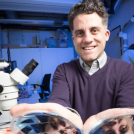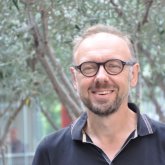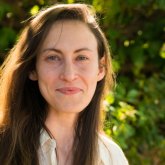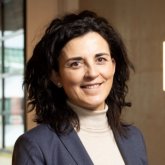Are you ready to work on the old dream of curing deafness?
We offer one exciting research position in the Mesoscale Chemical Systems group.
Join our highly motivated and multidisciplinary team working on revolutionary methods for needle-free injections!
Hearing loss affects millions of people, but delivering medication deep into the inner ear remains a major challenge. Therefore, this project, funded by the ZonMw Open Competition grant, will address this problem with a precise and gentle solution.
We plan on developing novel methods, including needle-free injections for the accurately delivering drugs. By combining microfluidics, human tissue models, and patient involvement, the project aims to make treatments for hearing loss safer, more effective, and more widely accessible. The project will be executed in collaboration with researchers from Radboudumc, Medizinische Hochschule Hannover, and the University of Twente. We will perform fundamental research and clinical collaboration with support from the TechMed Centre and MESA+ Institute.
This project will use state-of-the-art technology developed in the BuBble Gun Project.
Together with collaborating experts from medical centers, commercial partners and spin-off companies, this project will contribute to developing a novel technology to provide personalized and effective medical and cosmetic treatments.
More general info:
New-technology-for-drug-delivery-in-hearing-loss
What will you be doing and learning?
The two PhD candidates working on this project will have complementary expertise in medical biology and bioengineering, and will be based at Radboudumc and UTwente, respectively. Close collaboration between the PhD students will foster the synergy between all project partners. The PhD candidates will frequently move between our partnering institutions (1.5-2h travel) to fully integrate their expertise and advance the research. Using video calling, the unique expertise in cochlea biophysics from the Hannover team is easily integrated.
The main objective of the work is to find how can we (repeatedly) deliver drugs to the cochlea in a safe and sustainable manner?
Moreover, we will:
o Characterize the mechanical and biological properties of the RWM.
o Develop numerical and in-vitro models to investigate drug delivery.
o Employ microfluidics technology to identify safe and minimally invasive methods for intra-cochlear drug delivery.
Experimental plan: To develop reliable numerical/computational methods to study liquid-tissue dynamic properties. Here the team will ensure reproducible conditions to obtain parameters of tissue response at spatiotemporal scales not achieved before, with complimentary techniques.
We will establish finite element (FE) models of the human cochlea in (not limited to ABAQUS, ANSYS, etc.), using cochlear geometry obtained from literature.
The model will be refined to implement the specific properties of the different RWM models, employing Particle methods (e.g. Episim and UTwente’s MercuryDPM) to simulate the dynamics of discrete cells and Newtonian and non-Newtonian fluid-structure interaction models to assess how the intracochlear fluid (perilymph) influences RWM deformation.
We will also develop in-vitro models that better resemble the intricate cochlear architecture to investigate drug delivery. Moreover, we will employ microscopy techniques to describe tissue integrity and drug pathways at the molecular level. This will help us understand how both the drugs and drug solutions behave during paracellular drug delivery.
Information and application
To apply, please submit your application by the button below, this should include:
- A cover letter (maximum 1 page A4) emphasizing your specific interest, qualifications, and motivations to apply for this position.
- A Curriculum Vitae, including a list of all courses attended and grades obtained, and, if applicable, a list of publications and references.
- Email addresses of at least two references who are willing to send a letter of recommendation on your behalf.
- An IELTS-test, Internet TOEFL test (TOEFL-iBT), or a Cambridge CAE-C (CPE). Applicants with a non-Dutch qualification and who have not had secondary and tertiary education in English can only be admitted with an IELTS-test showing a total band score of at least 6.5, internet. TOEFL test (TOEFL-iBT) showing a score of at least 90, or a Cambridge CAE-C (CPE).
An interview with a scientific presentation will be part of the inerview proces.
About the department
The PhD-candidate will work together with members of the Mesoscale Chemical Systems, and in collaboration with several academic and industrial partners from the medical sector and spin-off companies. This project will use state-of-the-art technology developed in the BuBble Gun Project (https://bubble-gun.eu).
The group is in embedded within an international network and promotes international collaboration and exchanges. In particular, this project will be in collaboration with the ErasmusMC Academic Hospital in Rotterdam, The Netherlands, the Department of Mechanical Engineering at the Massachusetts Institute of Technology MIT, and the School of Medicine in Harvard, USA.
Our group has a highly international character and a unique expertise in micro and nanofabrication. We are backed by the outstanding experimental facilities of MESA+ NanoLab and the Technical Medical Centre, both widely recognized for its cutting-edge developments in advanced microengineering and biomedical technology.
The research and valorization activities of the group encompass microfluidics, ultrasound technologies, electrochemistry and bioengineering. MCS offers a rich, multidisciplinary and very international (over a 12 nationalities) environment where experimental physics, advanced chemical processes and simulation work are applied to solve relevant societal problems, as well as curiosity driven.
The Mesoscale Chemical Systems (MCS) is headed by Prof. Han Gardeniers and is active in three main activities: (i) structure materials in 3D down to the nanometer scale; (ii) manage fluids at the mesoscale; and (iii) engineer microsystems with integrated functionality. More information can be found on our [website] (http://mcs.tnw.utwente.nl)
About the organisation
The Faculty of Science & Technology (Technische Natuurwetenschappen, TNW) engages some 700 staff members and 2000 students in education and research on the cutting edge of chemical technology, applied physics and biomedical technology. Our fields of application include sustainable energy, process technology and materials science, nanotechnology and technical medicine. As part of a people-first tech university that aims to shape society, individuals and connections, our faculty works together intensively with industrial partners and researchers in the Netherlands and abroad, and conducts extensive research for external commissioning parties and funders. Our research has a high profile both in the Netherlands and internationally and is strengthened by the many young researchers working on innovative projects with as doctoral candidates and post-docs. It has been accommodated in three multidisciplinary UT research institutes: Mesa+ Institute, TechMed Centre and Digital Society Institute.





